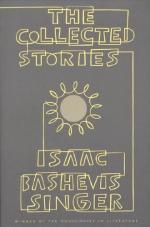|
This section contains 1,947 words (approx. 7 pages at 300 words per page) |

|
SOURCE: "I. B. Singer's Two Holy Fools," in Yiddish, Vol. 8, No. 2, 1992, pp. 35-9.
In the following essay, Drucker examines "wise fool" characters in "Gimpel the Fool" and Shosha. As Drucker notes, these characters achieve transcendent vision through spiritual openness rather than traditional Jewish religious study based on logical deduction.
A gantser nar iz a halber novi. A whole fool is half a prophet.
A halber nar iz a gantser khokhem. Half a fool is a complete sage.
These proverbs, seemingly contradictory, are usually interpreted as having ironic import—yet at first glance, their meaning is ambiguous and could imply the wisdom of fools. There are many words for fool in Yiddish and many types of fools in Yiddish literature: clever fools like Hershel Ostropolier, witless fools like the residents of Chelm, and a variety of luckless fools, whether schlemiels or schlimazls. This paper focuses on the holy fool...
|
This section contains 1,947 words (approx. 7 pages at 300 words per page) |

|


